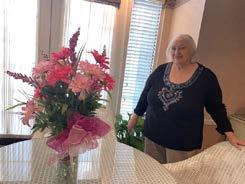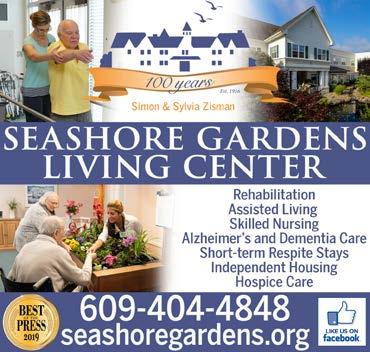
4 minute read
Lifestyle Wellness
FORGET ME NOT
Easing the Struggle of Living with Dementia
Advertisement
By Felicia L. Niven
In Nicholas Sparks’ epic romance, The Notebook, we meet Noah and Allie as they engage in one of their daily rituals. It’s the retelling of their love story in the nursing home where Allie now resides. Noah shuffles over and sits in a chair that has practically assumed his shape. He picks up the notebook with the story he’s read 100 times. Then he begins anew, reading to a woman who no longer remembers his name. It’s an emotional journey that results in a moment of clarity. Allie recognizes Noah for a brief time before the memory fades.
It may be a fictional scene but it’s not far from the heartbreak associated when a loved one has dementia. Unfortunately, too many people are impacted by this devastating disease. The World Health Organization estimates that 50 million people are living with dementia and nearly 10 mil lion new cases are diagnosed each year.
Dementia is the umbrella term for a group of conditions that impair memory and the ability to communicate and perform daily tasks. These include Alzhei mer’s disease, frontotemporal disorders, Lewy body dementia, and other types of progressive brain disease. Alzheimer’s is the most prevalent. One in nine people aged 65+ has Alzheimer’s disease, and one in three seniors will die from it or another type of dementia, according to the Alzheimer’s Association. In fact, Alzheimer’s disease is the sixth leading cause of death in the U.S., greater than breast cancer and prostate cancer com bined.
In addition to causing human suffering, Alzheimer’s eco nomic impact is significant. The Partnership to Fight Chronic Disease projects “the cumulative total cost of Alzheimer’s dis ease between 2017 and 2030 will be $7.7 trillion — $3.2 trillion in health care costs and $4.5 trillion in the value of unpaid caregiving.”
Those who work in Alzheimer’s and dementia care under stand the emotional and physical toll that it can take on caregivers. “It can be overwhelming to take care of a loved one with Alzheimer’s or dementia,” said Alysia Price, executive director of Seashore Gardens Living Center. “Caregivers can experience high levels of stress, depression and anxiety that can affect their own health.”
Caregiving becomes more challenging as dementia progress es. In Alzheimer’s, changes in the brain start years before there is any visible sign of the disease.
Anna enjoying the flowers in her home in the Comfort Care neighborhood of SGLC. Symptoms then progress through three stages. In the early stage, someone with Alzheimer’s will experience problems with mem ory or concentration. They still can drive, work, volunteer and
interact socially. However, he or she may have difficulty coming up with the right word, forget information they just heard or read, and misplace items. During the second stage, the individual may forget important events, be confused about the date, and be unable to recall basic information such as their address or where they graduated high school. He or she may experience increased anger and frustration. In the final stage, the person is unable to carry on a conversation and needs help with daily activities.
The Centers for Disease Control (CDC) estimates that more than 16 million Americans provides unpaid care for loved ones with Alzheimer’s disease and related dementias. Those who seek residential care choose senior living communities with special “memory care” units.
Seashore Gardens Living Center has such a neighborhood, known as the Comfort Care Residence. A Certified Dementia neighborhood, Comfort Care is a safe and secure environment that was carefully designed for the unique needs of individu als with Alzheimer’s and forms of dementia. The
Est. 1916
staff receives special training, and the programming is designed to keep residents active.
“Before we brought our mom here, we couldn’t get her to so - cialize,” said the daughter of one resident. “It’s the exact opposite at Seashore Gardens. She has a group of friends that she travels with, and they go to all of the activities, the crafts, the drum circles. The amount of effort that goes into every activity is truly as - tonishing.”
Activities in the Comfort Care Residence start around 8:30 a.m. or 9 a.m. and go until about 6:30 p.m. They include music, bingo, cooking classes, aromatherapy, massage, crafts, games, and piz - za parties. Residents enjoy a bi- monthly ElderGrow gardening program that provides healing benefits such as reduced agitation and improved self-esteem.
In addition, Seashore Gardens Living Center offers a commu - nity resources for caregivers of loved ones with Alzheimer’s or Dementia. They are invited to a free Alzheimer’s Support Group meeting on the third Wednesday of every month at 4:30 pm at Sea - shore Gardens Living Center, 22 W. Jimmie Leeds Road, Galloway, NJ. This is an opportunity for caregivers to learn about resourc - es, find strategies for dealing with a loved one with memory loss, and meet others in similar circum - stances. The meeting lasts an hour and includes complimentary re - freshments.
For more information, call 609- 404-4848. n
Group activities have been temporarily suspended due to recommendations from the CDC and Department of Health.
BE STRONGER THAN YOUR EXCUSES




YOGA BARRE HIIT SCULPT
7817 VENTNOR AVENUE MARGATE • NJ • 08402 www.GOODKARMAGUIDE.com










